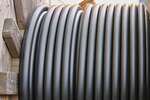12/03/2011
Europe - Requirement for new magnet materials has massive impact on research within the wind energy sector
In the past, 95% of rare-earch material used in applications such as wind-turbine generators has been supplied to the world by China, now an unreliable source
Increasing demand and a shrinking supply of rare-earth elements for magnets creates an opportunity for a research team at Oak Ridge National Laboratory and the University of Minnesota. The goal is to create a recipe for a replacement that doesn’t use scarce ingredients. The prospect of not having enough rare earth elements such as neodymium and dysprosium for magnets looms large for industries that need them.
“Worldwide demand for rare earths is expected to exceed supply by some 40,000 tons annually by the end of the decade,” says Larry Allard, a researcher in ORNL’s Materials Science and Technology Division. “In the past, 95% of the material has been supplied to the world by China, but in recent years China has begun limiting exports. By 2015 it is expected to become a net importer.”
Most people never give it a second thought, but magnets are used in everything from the motors that power hybrid vehicles and electric windows to windmills, computers, and hundreds of items that touch our lives every day. The traction-drive components of a Toyota Prius, for example, use about 2 lb of magnet materials while a 3-MW wind turbine uses 550 lb. From an economics and national security perspective, the shortage would be catastrophic.
ORNL’s David Parker commented that there’s nothing “sacred” about rare-earth elements. “Their main advantage is that due to their large nuclear charge, spin-orbit coupling is very strong and serves to fix the magnetization direction of the unpaired electrons. Other heavy elements may play the same role.”
Researchers Allard, Edgar Lara-Curzio and Mike Brady of ORNL, and Jian-Ping Wang at the University of Minnesota are focused on developing magnets made from abundant and inexpensive materials. Of specific interest is an iron-nitride compound with a specific phase that potentially exhibits the highest saturation magnetization ever reported for a material.
“This is a critical parameter related to the highest degree to which a material can be magnetized,” said Allard, who said this particular iteration of the iron-nitrogen compound has values up to 18% higher than the best commercial alloy, iron cobalt. The problem is that this material is metastable and exhibits relatively low coercivity, which means it demagnetizes easily. The best permanent magnets, such as those made of neodymium-iron-boride, score high in such areas.
The team will devise a method of producing this pure phase, iron-nitride compound and use specialized modeling methods to better understand the role of alloying additions that might stabilize the material so it retains its magnetic properties. The researchers hope to better understand the magnetic behavior of the “alpha double prime” phase by correlating microstructure at the atomic level to processing and magnetic behavior.
Once researchers characterize the elusive phase, their goal will be to make bulk quantities of the material and move toward their ultimate goal of replacing neodymium-iron-boride magnets for wind, automotive, and other energy technologies. This work with the University of Minnesota builds on previous work with Wang in which ORNL researchers were able to characterize iron nitride films with demonstrated potential. Allard noted that the Spallation Neutron Source made it possible to perform polarized neutron reflectometry, a test performed by Valeria Lauter to determine magnetic property.
In a separate effort, ORNL’s David Parker hopes to computationally screen dozens of materials and then mix elements that emerge as promising candidates in a way to create a compound that will behave like rare-earth elements. This material must also be scalable, retain its magnetic properties under many conditions, and meet cost-performance criteria. Parker noted that the compounds identified often have useful properties consisting of elements with greatly differing melting points, stabilities, and other traits, but can be difficult to manufacture.
“We have a suite of conventional and novel processing approaches to try to make the computationally predicted compounds, including a range of powder consolidation and gas reaction approaches,” said Parker.
For more information on this article or if you would like to know more about what www.windfair.net can offer, please do not hesitate to contact Trevor Sievert at ts@windfair.net
www.windfair.net is the largest international B2B Internet platform – ultimately designed for connecting wind energy enthusiasts and companies across the globe!
Increasing demand and a shrinking supply of rare-earth elements for magnets creates an opportunity for a research team at Oak Ridge National Laboratory and the University of Minnesota. The goal is to create a recipe for a replacement that doesn’t use scarce ingredients. The prospect of not having enough rare earth elements such as neodymium and dysprosium for magnets looms large for industries that need them.
“Worldwide demand for rare earths is expected to exceed supply by some 40,000 tons annually by the end of the decade,” says Larry Allard, a researcher in ORNL’s Materials Science and Technology Division. “In the past, 95% of the material has been supplied to the world by China, but in recent years China has begun limiting exports. By 2015 it is expected to become a net importer.”
Most people never give it a second thought, but magnets are used in everything from the motors that power hybrid vehicles and electric windows to windmills, computers, and hundreds of items that touch our lives every day. The traction-drive components of a Toyota Prius, for example, use about 2 lb of magnet materials while a 3-MW wind turbine uses 550 lb. From an economics and national security perspective, the shortage would be catastrophic.
ORNL’s David Parker commented that there’s nothing “sacred” about rare-earth elements. “Their main advantage is that due to their large nuclear charge, spin-orbit coupling is very strong and serves to fix the magnetization direction of the unpaired electrons. Other heavy elements may play the same role.”
Researchers Allard, Edgar Lara-Curzio and Mike Brady of ORNL, and Jian-Ping Wang at the University of Minnesota are focused on developing magnets made from abundant and inexpensive materials. Of specific interest is an iron-nitride compound with a specific phase that potentially exhibits the highest saturation magnetization ever reported for a material.
“This is a critical parameter related to the highest degree to which a material can be magnetized,” said Allard, who said this particular iteration of the iron-nitrogen compound has values up to 18% higher than the best commercial alloy, iron cobalt. The problem is that this material is metastable and exhibits relatively low coercivity, which means it demagnetizes easily. The best permanent magnets, such as those made of neodymium-iron-boride, score high in such areas.
The team will devise a method of producing this pure phase, iron-nitride compound and use specialized modeling methods to better understand the role of alloying additions that might stabilize the material so it retains its magnetic properties. The researchers hope to better understand the magnetic behavior of the “alpha double prime” phase by correlating microstructure at the atomic level to processing and magnetic behavior.
Once researchers characterize the elusive phase, their goal will be to make bulk quantities of the material and move toward their ultimate goal of replacing neodymium-iron-boride magnets for wind, automotive, and other energy technologies. This work with the University of Minnesota builds on previous work with Wang in which ORNL researchers were able to characterize iron nitride films with demonstrated potential. Allard noted that the Spallation Neutron Source made it possible to perform polarized neutron reflectometry, a test performed by Valeria Lauter to determine magnetic property.
In a separate effort, ORNL’s David Parker hopes to computationally screen dozens of materials and then mix elements that emerge as promising candidates in a way to create a compound that will behave like rare-earth elements. This material must also be scalable, retain its magnetic properties under many conditions, and meet cost-performance criteria. Parker noted that the compounds identified often have useful properties consisting of elements with greatly differing melting points, stabilities, and other traits, but can be difficult to manufacture.
“We have a suite of conventional and novel processing approaches to try to make the computationally predicted compounds, including a range of powder consolidation and gas reaction approaches,” said Parker.
For more information on this article or if you would like to know more about what www.windfair.net can offer, please do not hesitate to contact Trevor Sievert at ts@windfair.net
www.windfair.net is the largest international B2B Internet platform – ultimately designed for connecting wind energy enthusiasts and companies across the globe!
- Source:
- Oak Ridge National Laboratory and the University of Minnesota / Special thanks to ORNL
- Author:
- Posted by Trevor Sievert, Online Editorial Journalist / ORNL Author
- Email:
- ts@windfair.net
- Link:
- www.windfair.net/...
- Keywords:
- wind, wind energy, wind turbine, rotorblade, awea, ewea, wind power, suppliers, manufacturerstrevor sievert
























